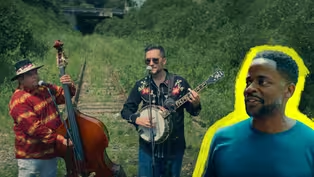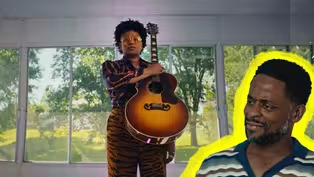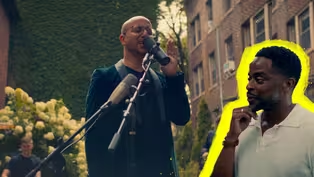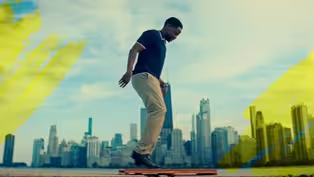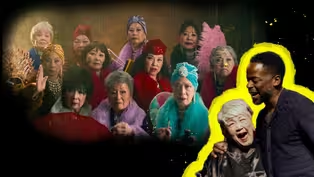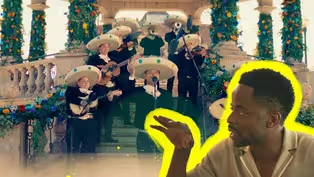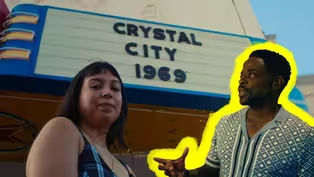
Learning to Dance While Deaf
Special | 11m 42sVideo has Closed Captions
Deaf dancer Shaheem Sanchez changes how Dulé Hill thinks about dance.
Shaheem Sanchez is showing the world that the “deaf can dance.” Dulé Hill learns how Shaheem taught himself to dance after going deaf at the age of four, and the dancer’s mission to ensure that deaf people aren’t limited by their disability.
Problems playing video? | Closed Captioning Feedback
Problems playing video? | Closed Captioning Feedback
This program was made possible by a grant from Anne Ray Foundation.

Learning to Dance While Deaf
Special | 11m 42sVideo has Closed Captions
Shaheem Sanchez is showing the world that the “deaf can dance.” Dulé Hill learns how Shaheem taught himself to dance after going deaf at the age of four, and the dancer’s mission to ensure that deaf people aren’t limited by their disability.
Problems playing video? | Closed Captioning Feedback
How to Watch The Express Way with Dulé Hill
The Express Way with Dulé Hill is available to stream on pbs.org and the free PBS App, available on iPhone, Apple TV, Android TV, Android smartphones, Amazon Fire TV, Amazon Fire Tablet, Roku, Samsung Smart TV, and Vizio.
Buy Now
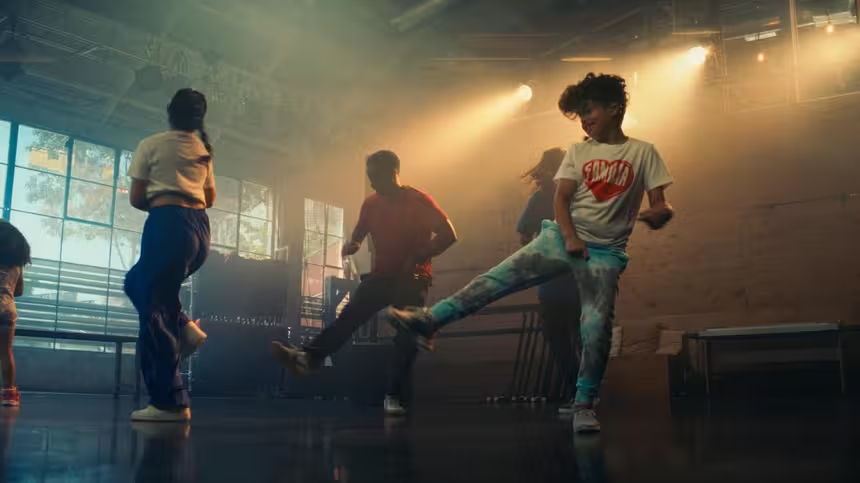
5 Artists Showcasing the Power of Art
From colorful cabarets and moving movies to artistic techniques that transcend the senses, here are five inspiring artists highlighted in The Express Way with Dulé Hill.Providing Support for PBS.org
Learn Moreabout PBS online sponsorshipMore from This Collection
This digital series follows Dulé Hill as he connects with diverse artists across America, exploring their history and letting us into their world on a deeper level.
Blending Latin Folk and Bluegrass Music
Video has Closed Captions
Larry & Joe are blending Latin folk and bluegrass music to show music has no borders. (16m 59s)
Finding Identity as a Black Appalachian Artist
Video has Closed Captions
Dulé Hill explores how music can provide solace and healing with musician Amythyst Kiah. (14m 51s)
Fighting for Syrian Refugees with Soul Music
Video has Closed Captions
A Syrian-American musician brings awareness to the civil war in his family’s homeland. (11m 32s)
Dulé Hill’s History of Tap Dance
Video has Closed Captions
Dulé Hill shares his motivation for mastering tap dance and carrying its legacy forward. (7m 45s)
Revitalizing Nightlife in San Francisco’s Chinatown
Video has Closed Captions
A multi-generational effort to preserve San Francisco Chinatown’s rich cultural history. (10m 3s)
Reimagining the Mariachi Charro Suit
Video has Closed Captions
Mariachi Arcoiris de Los Angeles reimagines the mariachi charro suit. (8m 36s)
Fighting for the Right to Speak Spanish
Video has Closed Captions
A new play tells the story of a Latino student walkout that changed history in Texas. (8m 13s)
Providing Support for PBS.org
Learn Moreabout PBS online sponsorshipDulé: Hill: I'm in an area they call the Fairfax District.
I'm getting ready to meet a phenomenal dancer, a gifted artist by the name of Shaheem Sanchez.
I first got hip to Shaheem through his amazing TikTok videos.
♪ Shaheem is also an actor, appearing in the Oscar-nominated "Sound of Metal," and a choreographer and an activist fighting for the inclusion of deaf and disabled people.
As a lifelong dancer, I'm curious to know how Shaheem connects to the music that he can't hear.
♪ Shaheem Sanchez.
Hill: What's up?
All is well, man.
You know, at some point, we gonna have to dance.
You see?
You see?
Sanchez: Oh... Hill: Oh, man, it's wonderful to meet you.
Hill: Yeah.
You started dancing at what age?
Hill: 11.
OK. How did you find...dance?
Hill: OK. Sanchez: Loud.
Woman: Hey!
[Hip-hop music playing] ♪ ♪ [Music muffled] ♪ Woman: Shaheem lost his hearing at 4 years old because of the bad nerve.
It was kind of hard when we knew because he didn't know sign language, of course, not yet.
We had to write things down just so he can understand what I was saying... Hunter: but he always danced.
He'd be like, "I want to be a famous dancer."
♪ [Cheering and applause] Hill: Can you walk me through how you explore music?
Hill: Mm-hmm.
Hill: Say, like on the speaker right there.
OK. Uh-huh.
♪ Hill: I want to learn how you do it.
Yes.
Hill: Yeah, how you do it.
Hill: Yeah.
Hill: OK. [Distant siren] ♪ ♪ Hunter: Shaheem was a class clown.
He was always dancing at school.
Shaheem was always dancing on the corner.
"Shaheem gets on my nerves.
He's always dancing in class."
He wanted to connect, and he wasn't gonna give up.
♪ ♪ ♪ Hunter: He learned sign language in two months.
You know he was gonna learn it quick because he was determined to.
He wanted to know what was going on.
♪ ♪ Hill: Dance exudes joy.
If you walk into dance in pain, if you walk into dance in hurt, you exit out on the other side in euphoria, in delight, in joy.
After being around my brothers and my sisters in dance, you cannot help but be affected by the positivity and belief in a brighter tomorrow.
♪ [Birds chirping] Hill: Where are we going?
Hill: OK. Hill: Oh, yeah.
Heh.
Sanchez: What's up?
Hill: Hey, hey!
Ha ha ha!
Hello.
It's so nice to meet you all.
How do you all know each other?
Woman: I'm the founder of Infinite Flow.
I guess I brought everyone together.
So we're a dance company that employs disabled and nondisabled dancers.
Our mission is to create a more inclusive world, and we're just here to say, "Hey, like, everyone can dance."
Hill: What was the impetus to start Infinite Flow?
Hamamoto: I'm a stroke survivor, so at one point in my life, I was paralyzed from the neck down, but I also grew up aspiring to be a dancer.
We know that dance is a universal language that belongs to everyone, yet society thinks that dancers have to be a certain way, and out of all types of people, disabled people are the most stigmatized when it comes to dance, and I just didn't think that was right.
Hill: Right.
Schaikewitz: We think our disabilities actually make us capable and more of who we're supposed to be in this world, and I think that's a beautiful thing, so we celebrate that.
Hill: Right.
Hamamoto: And that's why one of our favorite projects is performing at elementary schools, 'cause we believe that if we can educate kids from a young age... Hill: Yes.
Hamamoto: kids would grow up in a very different way.
Shaheem played a very integral part in our youth programs.
Hunter: Shaheem was on a teaching mission.
Hunter: He's teaching a lot of deaf people.
Sanchez: One...
Girl: Shaheem is, like, a really good dancer.
I like the way he moves.
I was looking through his Instagram, and I just liked how he was very confident, and he looks like a role model to me.
Hunter: He's teaching sign language with choreography, putting the words to the song with his hand.
It's making people want to-- even us hearing people, we want to learn that because it's a different style of dance.
Hill: It seems like you are using your gifts to rewrite the story, to take away the stigma that is there and say, "This is really who we are," really normalizing what, to many folks, has seemed abnormal.
Hamamoto: You want to be my spokesperson?
Ha ha ha!
Hill: Ha ha!
Hamamoto: So are we gonna dance or what?
Hill: Ah, yeah.
OK. Hamamoto: By the way, there's pizza, so-- Man: Yes!
Man 2: Wow!
Yes!
Man: Yes!
♪ Hill: Art is a thing where you open up yourself and share what you have inside of you with the world.
[Laughter] You affect the world around you in a positive way, in a joyous way.
That's the beauty of expression.
That is the magnificence of art.
Hill: Thanks for watching.
For more of "The Express Way" with me, Dulé Hill, you can tune in to the full-length series on the PBS app or your local PBS station.
Check out the link in the description to watch a full episode and find out more about the show.
Support for PBS provided by:
This program was made possible by a grant from Anne Ray Foundation.
